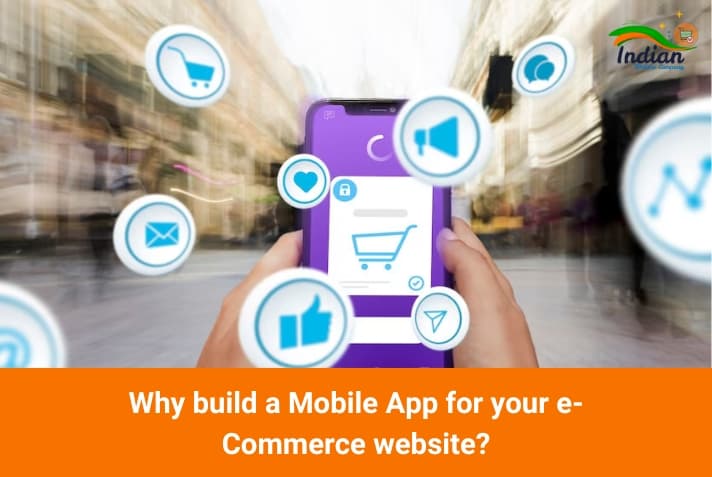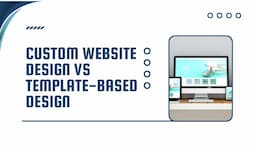Why build a Mobile App for your e-Commerce website?

It is no longer enough for businesses to have a website in today's ever-changing digital landscape. If you want to be successful in business, you need an eCommerce mobile app, which is currently leading the industry in terms of usability and effectiveness for both business owners and customers. In this situation, the sky is the limit for eCommerce firms. People are purchasing online in greater numbers than they have ever been. Your eCommerce firm, on the other hand, can never attain its full potential with just a website. When you look at the most recent eCommerce trends, you'll see that everything is moving toward mobile. According to recent study, 96 percent of adults in the United States own a cell phone, with 81 percent owning a smartphone. Take a look around. Everyone has their phones in their hands virtually all of the time. So, how can you take these figures and use them to boost your eCommerce sales? The answer is straightforward: your company requires an eCommerce mobile app.
"If you're serious about eCommerce, you should be serious about SEO," say experts.
Given the positive growth of mobile applications, a tipping point is approaching in which mobile devices will soon overtake desktops as the primary platforms for online shopping. Customers using mobile devices to purchase items and services are driving eCommerce development all around the world.
Retail eCommerce sales reached $3.5 trillion in 2021, according to eMarketer estimates. If you want to succeed in today's digital world, you need to understand the value of eCommerce app development and be willing to adapt. You've embraced the idea of having an eCommerce mobile app if you want to build a robust eCommerce business with consistent sales and a growing customer base.
What's the Difference Between a Website a
nd an App?
A mobile website is a mobile-optimized version of a company's website that can be seen using the browser on a mobile device. A standalone software application that is downloaded and installed on a mobile device is known as an app.
What Exactly Is an App?
An app (short for "software application") is a programme that can be downloaded from an app store and installed on a mobile device to run on an operating system such as iOS or Android. Some businesses create apps to enable customers to connect with their brand and products on their mobile devices in a self-contained environment.
Progressive Web Apps: "Progressive web applications" (PWAs) have developed as a viable alternative to traditional apps in recent years. When viewed by a device with a specified screen size, PWAs are essentially websites developed to display in an app-like manner, sometimes with features like full-screen display and push notifications. On their mobile devices, they can find products in a self-contained experience.
Why mobile app is important for eCommerce?
Consumers are currently using their mobile devices, thus ecommerce must follow them. Over the last few years, major brands such as Amazon, IKEA, and Starbucks have all made the switch to mobile, and the results speak for themselves.
However, mobile eCommerce is about more than just making more money. It's also backed up by innovative and very successful ways for businesses to interact with their customers.
Mobile applications give businesses new ways to connect with customers and provide them with high-value customer experiences that aren't available with a web browser. Consider how successful push notifications may be in attracting consumers back and keeping them updated about your offers!
Things to consider before getting mobile app developed for your ecommerce website
Understand your business model
Before you start your firm, you need to figure out which of the four key commerce categories your company falls into. The following are the categories:
B2C stands for Business to Consumer.
B2B stands for Business to Business, C2B is for Consumer to Business, and C2C stands for Consumer to Consumer.
This phase is critical for determining the category of your app and designing and developing it in accordance with common requests and trends in that vertical.
Requirements for devices
Although designing an e-commerce application for both Android and iOS requires additional effort, as a merchant, it is preferable to be available on both platforms to cater to the demands of customers who use both platforms. You can choose from:
Native app- This type is developed exclusively for one platform. Web based app- . It is available via the network connection with help of HTTP. Cross platform app- . It combines two previously-mentioned types together (putting web app to the native app shell).
Features
The application's visual side should draw in more users, while the technical aspect should work in your favour. The features you choose should always be aimed at improving your products or services. Features might be particular or general, depending on your product. Customer Chat Support, Reviews & Ratings, Multiple Payment Options – both online and offline, Simple Return/Exchange Policies, Category-wise Listing of Products/Services, and so on are just a few of them. Remember that every new relevant feature you offer to your application brings value to your company.
Optional Payments
The goal of E-Commerce application development is to provide a seamless connection between customers and vendors. Because almost all E-commerce businesses do not cater to customers in specific geographic areas, you must provide a diverse choice of generic payment alternatives. Even while credit cards, debit cards, UPI, and Net banking are all required these days, it's great if you can incorporate an E-wallet as your company grows.
Communication with Customers
Customers must always be informed about the modifications and innovations that you implement in your company. They must be aware of all new improvements, features, and deals you make available on your platform in order to fully utilise it and then spread the word. As a result, you should always remember to keep your App's client communication channels, such as transaction emails, push notifications, and messaging, healthy and active.
Advertising
Getting customers to come to your e-commerce application and use it necessitates the usage of advertising. As the world of business moves online, so do the majority of marketing strategies. Every online business now relies heavily on digital marketing. Having the proper digital marketing professionals on your team boosts your chances of having a successful online business. These people will go above and beyond to acquire the appropriate kind of Search Engine Optimization strategies, as well as effective social media marketing techniques and more, to get the right crowd for your business flooding in to use your services.
Analytics
Even if you own a tiny business, you must now keep track of your sales and other activities. Analytics is essential for monitoring online traffic, search data, and maintaining the integrity of your website. It's also crucial to comprehend purchasing trends, customer behaviour, and so forth. These days, integrating your app with the correct analytic tools is also a must-have.
Mobile commerce trends 2022 include:
chatbots
Augmented reality
wishlist
geo fencing (promote goods according to location of user)
voice assistants
omnichannel shopping experience
one click purchasing
personalised shopping experience
Big Data ( to stock products as per customer choice and approprite pricing)
How to create a mobile app that converts?
'
Design app that provides security, scalability
API integrated
provides quality assurance services
zooming product photos using touch gestures
enables to save shopping cart items
seamless checkout
a clearly visible search bar
enable automatic suggestions
Why should my eCommerce store have an app?
There are various reasons why a business should have an eCommerce mobile app. The following are the most important:
Increase your marketing communication
Almost every company spends a significant amount of money on marketing. While an eCommerce mobile app for your business won't let you down in terms of sales, this platform goes above and beyond. You'll be able to create even more income from your present and future customers by fine-tuning your PPC marketing efforts. If you don't have a mobile eCommerce app, you'll have to rely on your customers going straight to your website to get any conversions. However, how often does the same consumer return to your website? Even your most devoted consumers are unlikely to purchase something every day or every week.
To reach your consumer base through extra channels, you spend marketing expenditures on social media marketing campaigns and email communication. However, with the help of an eCommerce mobile app, you'll be able to engage with your clients more effectively and efficiently via push notifications. Push notification features display alerts on the user's mobile app's home screen. When a user accesses it, he will be taken immediately to the app, where he will receive all of the necessary marketing content and be encouraged to make a purchase. Push notifications are a useful and effective way to reach out to customers and increase sales.
Increased Productivity
The user-friendly nature of mobile applications, as well as their numerous capabilities, have led to their widespread acceptance by a significant number of clients around the world. Even if you spend some money creating it at first, it will soon begin to provide you with unparalleled rewards in a short period of time. A well-designed app with useful features has proven improved sales results and profitability, and with correct planning and implementation of your marketing efforts, you'll be able to generate more revenue from your current and new clients. You may successfully satisfy clients' needs and greatly improve revenue by using mobile apps because they are manageable and user-friendly.
The link is simple: a well-designed and effective mobile app with the correct idea and functionality attracts more customers, and more customers lead to more orders, resulting in more income.
A shorter response time
Customers and company owners alike want a service that works flawlessly. When compared to a website, the reaction time for a mobile app to complete an activity is significantly less because mobile apps retrieve data quickly. Mobile apps often connect to servers in the same way that websites do, however data transmission between a mobile app and a server is substantially lower than between a browser and a server. This is due to the fact that mobile apps save data on the device in part.
Additionally, app users have the option of selecting their preferred filters and preferences, which instructs the app to display only the content that the user requires.
A variety of payment alternatives
Although websites offer online payment, mobile applications offer clients the convenience of paying via several payment channels such as credit/debit cards, UPI, and e-wallets. Online payments, for example. It is easier and more acceptable to integrate 3rd party payment via mobile apps. Both customers and business owners will benefit from it. This was especially noticeable during the Covid-19 outbreak, when customers were not allowed to touch one other during store visits or home deliveries.
Brand recognition
Mobile applications foster a strong bond between brands and their customers. Mobile apps remain on customers' devices indefinitely, causing them to choose your brand every time they require a service or purchase a product. When a customer is pleased with your service, they are likely to provide a review on social media and other platforms. This is a fantastic opportunity to promote the company, improve its reputation, and attract new customers. Customers would want to shop from your business on a regular basis if you provide excellent service with attractive discounts and offers. It proves to be quite beneficial to business owners in terms of brand development and long-term business.
A Unique Shopping Experience
Providing users with a personalised shopping experience is critical to the success of an eCommerce firm. Mobile apps will enable you to recognise consumers' regular purchasing patterns, allowing you to provide customised options to them. It can work wonders for your marketing efforts and sales when properly designed and integrated with push notification tactics. You might send personalised marketing campaigns based on the user's preferences rather than sending generic marketing campaigns. Similarly, an eCommerce mobile app simplifies the task of viewing a user's whole purchase history, making it easier for them to make regular purchases. According to a recent study, when purchasing online, 63 percent of users desire a personalised experience.
Customer Loyalty Should Be Increased
A customer loyalty programme is the most effective approach to convince your consumers to spend more money. Having an eCommerce mobile app boosts the likelihood of your clients participating in such a promotion. Customers are also more likely to shop from sites that provide customer loyalty programmes, with 82 percent expecting to do so. This is something you should definitely take advantage of.
Customers can check their status in a programme in real time via a mobile app. A loyalty programme encourages clients to spend more money in order to earn their next incentive. This motivates individuals to increase the value of their regular orders as well as their frequency of purchases in order to advance to the next spending tier. On their websites, some firms may already have a client loyalty programme. However, using a mobile app to run a comparable promotion or campaign will be even more effective.
With all of the aforementioned factors in mind, the value of a mobile app for an eCommerce firm is unrivalled. It's time to act now that you understand why an app is so vital for your eCommerce business. If you still don't have a mobile app for your company or are only managing your website, it's time to reconsider. Work with an experienced and reputable eCommerce mobile app development company to create a successful app that will set you apart from the competition.
Steps to create a mobile app
1. Wieframing- This primary stage includes the development and approval of your application’s wireframe.
2. UI/UX design- Here specialists create an app icon, screens, buttons, and other elements on the basis of your preferences and tastes.
3. App development- . During this step, the coding process happens to implement the required functions and essentially build the app.
4. QA testing- . All types of apps require checking how they perform for detecting bugs or any other issues and fixing to achieve the highest quality.
5. Deployment- . When all the bugs are fixed, the app is ready for deployment. Depending on the chosen platform you should launch an app on the market (Apple Store/Google Play) in accordance with their requirements.
Cost of mobile app development for ecommerce website in india
As you may be aware, the price of an ecommerce mobile app is determined by the amount of time the development team must spend on each feature. The more features a software has and the more sophisticated it is, the more time it takes to use it.
Importance of ecommerce mobile app development for small businesses
According to a survey, 63 percent of m-commerce mobile app users used them to compare prices, look for special offers, read product reviews, and eventually buy online. It's also common knowledge that 9 out of 10 clients keep their phones in their pockets at all times. While creating a responsive website may appear to be a smart idea, it cannot show material as quickly and easily as native apps. And if you don't invest in your ecommerce mobile app now, your clients might go to your competitors who do.
Why choose Indian website company for mobile app development for your ecommerce
Indian website company is a reputable software development firm based in India. For over ten years, we've specialised in bringing cutting-edge solutions to startups and medium sized businesses.
Indian website companys’ products aid in the improvement of workflow efficiency, the resolution of business difficulties, and the creation of competitive advantages.
Apart from the additional advantages that working with indianwebsitecompany brings to our clients, we provide a variety of flexible collaboration models that are tailored to each project's needs:
Time and Material allows you to begin project development with simply a rough estimate of undefined requirements. As a result, if the scope of work is uncertain and the software's requirements are dynamic, this alternative is advantageous.
A fixed-price contract is a one-time payment with a defined scope of work, precise estimates, specific requirements, and rigid deadlines. Customers thoroughly specify their requirements and receive a fixed, non-changeable final price before the product development process begins. This plan is ideal if you have a limited budget or if your needs are well-defined from the outset.
With a dedicated team, you can work with developers who are experts in the specific specialty your project necessitates.
Recent Blogs
![Is Shopify Good for Ecommerce Website? [Pros and Cons]](/_next/image?url=https%3A%2F%2Fwww.indianwebsitecompany.com%2Fimages%2F1751009322520_Is-Shopify-Good-for-Ecommerce-Website-Pros-and-Cons.jpg&w=256&q=75)
Is Shopify Good for Ecommerce Website? [Pros and Cons]

Web Design Trends to Follow in 2022 to Build an Awesome Website
